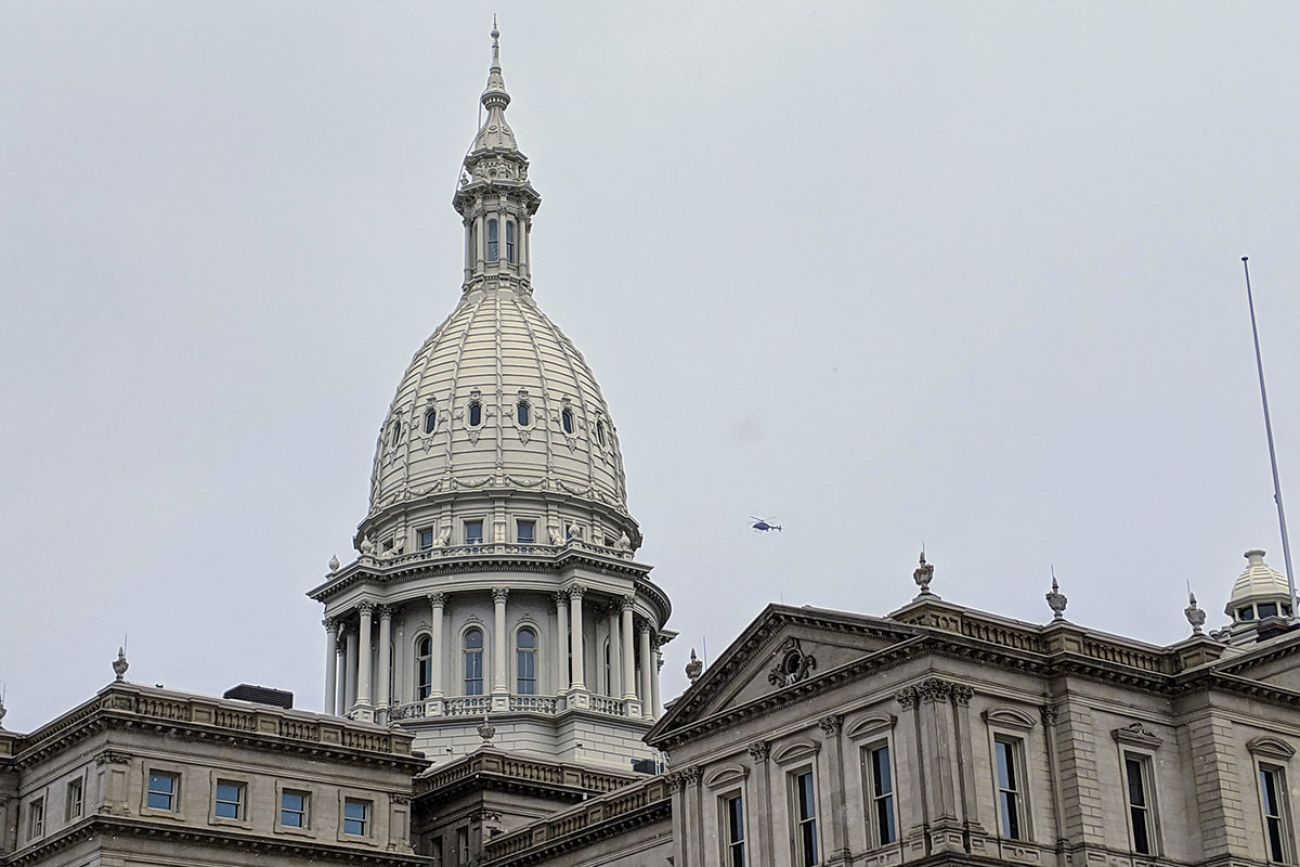Michigan lawmakers OK early voting, conversion therapy ban, Juneteenth holiday

- Lawmakers clearing the plate before budget talks, vacation
- Government employees would get Juneteenth off if Gov. Gretchen Whitmer signs bill
- Lawmakers also greenlighted lead exposure testing, conversion therapy ban, Proposal 2 implementation
LANSING — Michigan lawmakers on Wednesday passed legislation clearing the way for in-person, early voting, alcohol sales inside college stadiums, a statewide ban on conversion therapy and mandatory lead testing for young children.
Lawmakers also approved legislation that would make Juneteenth a state holiday, as well as bills related to child abuse prevention and Detroit teacher salaries during a frantic day of voting on Wednesday.
Related:
- Beer o’clock may beckon at Michigan college sports stadiums under new bill
- Michigan moves to adopt early voting; Republicans say efforts go too far
- Lawmakers take steps to ban conversion therapy in Michigan
The action was intended to clear the deck for lawmakers to begin deliberating the state budget over the next two weeks before vacationing for two months in July.
Here’s what happened Wednesday:
Implementing Proposal 2
Both the Senate and House adopted near-identical legislation to allow up to 29 days of early voting and other measures. The state Legislature must now decide which version to agree to and send to the governor for her signature.
The bills mostly codify reforms that were approved by voters last year through the Proposal 2 ballot measure. The bills would:
- Require election inspectors to lock early voting sites and secure ballots and tabulators
- Allow registered voters to receive absentee vote ballots for every future election unless the voter requests otherwise or is no longer qualified to vote in Michigan
- Require cities and townships to install at least one drop box for every 15,000 registered voters
- Require a drop box to be accessible 24 hours a day for 40 days before Election Day and until 8 p.m. on Election Day
- Allow photo IDs issued by local governments to be used for election purposes
- Allow use of an “on-demand” ballot printing system that would print out individual paper ballots for voters
- Require video surveillance of all drop boxes. Rep. Penelope Tsernoglou, D-East Lansing said the state would pick up the cost, estimated at $500,000 to more than $1 million.
SB367 and HB4695, the bills that lay out early voting, passed both chambers along mostly party lines, with Republicans opposing the measure on claims the legislation goes well beyond what was outlined in Proposal 2.
Other bills had bipartisan support.
Proposal 2 will cost the state millions of dollars, including $2.1 million for absentee ballot drop boxes and $4.8 million for postage costs for 6 million absentee ballots, according to an analysis by the nonpartisan House Fiscal Agency.
Early voting alone will cost the state $45.4 million next year, including $9.5 million by the state and $36 million by local governments, according to a bill analysis by the nonpartisan Senate Fiscal Agency. The department also projected that local governments would need to spend an annual $10 million starting fiscal year 2025.
SB247: alcohol sales in college stadiums
The Senate voted 36-2 to allow public universities to serve alcohol at college sports events. Under the bill, public universities would be able to obtain liquor licenses and sell alcohol from an hour before a game until 30 minutes after it ends.
The bill now goes to the House.
Michigan State University and University of Michigan would join 11 other Big Ten Conference universities in allowing alcohol sales in college stadiums, MSU Chief Safety Officer Marlon Lynch told lawmakers Tuesday.
Sen. Sean McCann, D-Kalamazoo, sponsored the bill. He said Tuesday universities allowing alcohol sale at games saw a drop in binge drinking, because there is less incentive to “preload.”
Senate Majority Floor Leader Sam Singh, D-East Lansing, voted against the measure because he said “neighborhood leaders” near Michigan State University fear alcohol sales at stadiums could lead to bigger crowds in neighborhoods and other problems.
HB4616-4617: Ban on conversion therapy
The bills, which cleared the House 56-53 along party lines, would ban mental health professionals — such as social workers, therapists, physicians, nurses, counselors and psychologists — from conducting conversion therapy on children to try to change their gender identity or sexual orientation.
LGBTQ advocates and experts have said conversion therapy is associated with mental health issues such as anxiety and depression and increases the suicide risk among teens.
The bill would make Michigan the 22nd state to ban conversion therapy. But the bill would not apply to religious providers.
Sen. Erika Geiss, D-Taylor, told Bridge Michigan last week that churches have First Amendment protections and would be hard to regulate. She contended that the bill would not prevent all conversion therapy for youths.
“There could very well be people … who aren't even engaging with mental health professionals, who do need it out of whatever fear or stigma they might already have around mental health,” she said.
Rep. Curt VanderWall, R-Ludington, argued the bill would push counselors out from the industry and prohibit them from telling children “struggling with their gender that they may not, in fact, be that opposite gender.”
“This bill would make it illegal for good actors to give good advice, not just stop bad actors from giving bad advice,” he added.
SB50: Juneteenth a state holiday
The House voted 105-4 to approve a bill to designate June 19, or Juneteenth, an official state holiday, meaning the government and courts would shut down on that day or the Monday after if Juneteenth falls on a Sunday.
Juneteenth commemorates the emancipation of African Americans and the freeing of the final slaves in the Confederacy on June 19, 1865, more than two years after the Emancipation Proclamation.
On that date, Union troops arrived in Galveston, Texas, and announced that the state’s 250,000 Black people were free, according to the Smithsonian.
“It is crucial that we speak the truth,” Rep. Helena Scott, D-Detroit, said on the House floor Wednesday. “This bill helps us do that by recognizing a past that cannot be forgotten or brushed under the rug.”
At least 28 states and the federal government recognize Juneteenth as a holiday.
Democratic Gov. Gretchen Whitmer is expected to sign the bill, as she issued a proclamation in 2002 recognizing the holiday as a paid day off for Michigan’s 53,000 state workers. The financial impact of the bill has yet to be determined, according to a nonpartisan analysis.
SB31: lead testing
The bill sponsored by Sen. John Cherry, D-Flint, would require physicians to test children up to 6 years old for lead exposure. The bill cleared the Senate 27-11 on Wednesday and will head to the House.
Children must be tested when they turn 1 and once again when they turn 2. If a child older than 2 has never been tested, they must be tested between the ages of 2 and 6.
In areas where there is a “high risk of child lead poisoning,” with children diagnosed with lead poisoning or people living in a house built before 1978, children must be tested when they are 4 years old.
Children in Michigan now are typically only tested for lead if they receive Medicaid, Cherry said.
“It is so much more critical when you are talking about infants and young kids because that’s when our brains are developing and, frankly, our whole bodies are developing.”
Parents would be able to opt out of the testing, the bill says. The state could also eliminate the testing requirements in five years if the state’s health department decides testing is no longer necessary.
Sen. Ruth Johnson, R-Groveland Township, unsuccessfully pushed for an amendment for the state to also develop arsenic testing guidelines for children who mainly get drinking water through private wells. Roughly 25 percent of Michigan residents rely on domestic wells for drinking water, according to state records.
HB4120-4125: child sexual abuse
The six-bill package aims to guard against sexual abuse against children and patients. The package comes five years after the conviction of Larry Nassar, former Michigan State University physician and U.S. Gymnastics team doctor who sexually assaulted hundreds of girls and women under the guise of medical treatment.
The package will now head to Whitmer. It would:
- Require the state to develop training materials for reporting suspected child abuse;
- Permanently revoke medical licenses for those who sexually abuse their patients;
- Prevent one from using authority to block the reporting of sexual abuses, and
- Prohibit schools from expelling pupils who are alleged sexual assault victims or suspending them for more than 10 days
A separate package cleared the Senate last month but has yet advanced in the House. That legislation would restrict physicians from sexually abusing their patients, establish a new felony for the crime and require schools to distribute educational materials to increase sexual assault awareness among students.
SB359: Detroit Public School Community District salaries
The Senate also voted 21-17 to remove a current state restriction on Detroit Public Schools Community District employees hired after September 2019, whose salaries are solely based on student performance.
The move would bring district employees up to the same evaluation standards that apply to other teachers in the state and allow them the right to collective bargaining, said bill sponsor Sen. Stephanie Chang, D-Detroit.
“This bill seeks to address an inconsistency in the law where all educators across the state are able to collectively bargain on certain topics except for educators in the Detroit public schools community district,” Chang said.
The current state restrictions were applied by a GOP-led Legislature in 2016 to address the school district’s debt crisis.
Sen. Lana Theis, R-Brighton, argued Wednesday the bill would take away the incentives for teachers to focus on improving student grades.
“To call this bill tone-deaf is a bit generous,” Theis said. “This is no time to go backwards in our state in terms of school standards.”
— Bridge reporter Lauren Gibbons contributed
See what new members are saying about why they donated to Bridge Michigan:
- “In order for this information to be accurate and unbiased it must be underwritten by its readers, not by special interests.” - Larry S.
- “Not many other media sources report on the topics Bridge does.” - Susan B.
- “Your journalism is outstanding and rare these days.” - Mark S.
If you want to ensure the future of nonpartisan, nonprofit Michigan journalism, please become a member today. You, too, will be asked why you donated and maybe we'll feature your quote next time!




